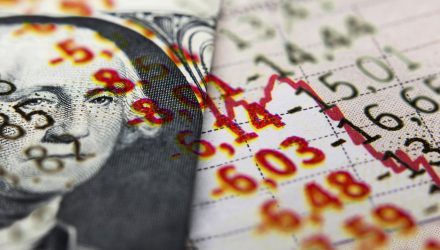While the wall of worry for U.S. investors include falling rates translating to a cheaper dollar, this has bullish emerging markets investors salivating as the capital markets may look to other corners of the globe for investment opportunities. Further rate-cutting by the Federal Reserve could certainly help feed into more strength for emerging markets.
One area where this could benefit emerging markets is in their local currency. With four straight rate increases in 2018, local currencies of these emerging markets suffered, which in turn, translated to weakness in their associated equities—but the tide may be turning.
Per a Bloomberg report, while “developing-nation currencies just weakened for the first time in three weeks, their implied volatility, at around 8.25%, remains below the past year’s average. The yield on emerging-market local-currency debt is within 10 basis points of the all-time low of 4.12% reached in August. And the MSCI Index of stocks isn’t far off its highest level in seven weeks.”
“We maintain an optimistic outlook for emerging markets going into the next few months as global central bank accommodation overshadows concerns of slower global economic growth,” said Anders Faergemann, a senior portfolio manager at Pinebridge Investments in London. “The overall market has taken the oil shock, the Fed meeting and the repo market confusion in its stride, suggesting it would have to take an even bigger flare-up in risk to unsettle financial markets.”
EM Debt Funds
Per the Bloomberg report, $933 million went into emerging-market debt-dedicated funds in the week through Sept. 18. This was more than double the $443 million that EM debt funds saw the previous week, according to Morgan Stanley.
For investors looking for the continued upside in emerging market assets, whether driven by a weakening USD or continued developments around trade, the Direxion MSCI Emerging Over Developed Markets ETF (NYSEArca: RWED) offers them the ability to benefit not only from emerging markets potentially performing well but from emerging markets outperforming developed markets.
Related: China Trade Deal May Be Key To Global Re-Balancing
RWED seeks investment results that track the MSCI Emerging Markets IMI – EAFE IMI 150/50 Return Spread Index. The Index measures the performance of a portfolio that has 150 percent long exposure to the MSCI Emerging Markets IMI Index and 50 percent short exposure to the MSCI EAFE IMI Index.
On a monthly basis, the Index will rebalance such that the weight of the Long Component is equal to 150% and the weight of the Short Component is equal to 50% of the Index value. In tracking the Index, the Fund seeks to provide a vehicle for investors looking to efficiently express an emerging over developed investment view by overweighting exposure to the Long Component and shorting exposure to the Short Component.
For more relative market trends, visit our Relative Value Channel.

